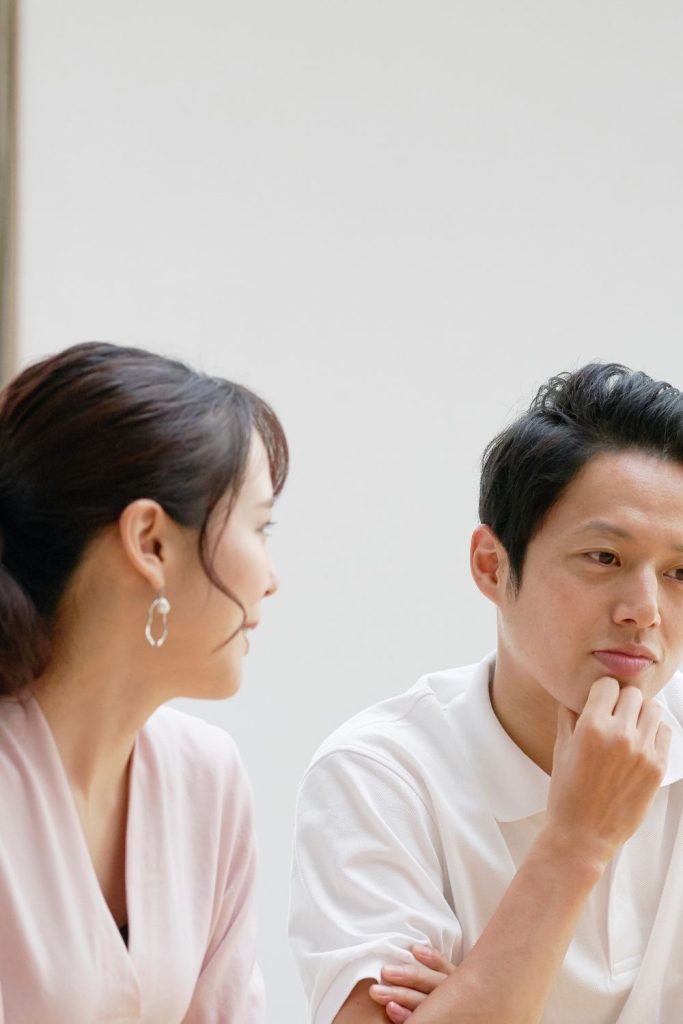Fights are not unusual in any relationship, especially one as close as a marriage, where you are in each other’s space all the time.
Sometimes when I think back on how much my sister and I used to argue and fight back in our parent’s house, I’m amazed because even in those moments, we still loved each other very much and would do anything for each other.
The presence of occasional arguments and fights does not mean you have a bad marriage or that love is absent in it.
But fights need to be resolved in healthy ways, leaving both parties understood and heard.
If your husband frequently gives you the silent treatment after you both have a fight, you may find yourself feeling upset and confused.
There can be many reasons for this;
He may still be feeling hurt, he may need some time to process his emotions, or he may just have become used to silent treatment as a habit.
Whatever the reason may be, it can leave you lost and wondering what to do.
Let us talk about a few things you can do to help your sanity and peace in a situation like this.
What To Do When Your Husband Ignores You After A Fight
1. Internalize the events

Before attempting to do anything about the situation, the first thing you need to do is pause.
Take some time out to process the fight and the interactions that occurred between you two.
Sometimes, it is best not to do anything because you are giving yourself time to internalize the happenings.
Interestingly, that may be the same thing your husband is doing by not talking to you.
He may be processing the fight and trying to make sense of the situation.
Do not focus on him at this moment, especially if he has ignored you before.
Focus on yourself and clear your mind.
In your moments of internalization, you may even realize what part of the altercation is responsible for your husband’s silence and know how best to fix it.
Make sure to tune in to your inner voice and truly grasp its message.
With a clear mind, let the ideas flow on how to tackle the situation when the time is right.
2. Give it time

It can be quite upsetting to see your husband ignoring you when you expect him to be trying to fix things up.
It is worse if you think he is in the wrong, and he should be apologizing to you.
You may feel mad and want to lash out in anger, but that is not the best thing to do.
Instead, take a step back and give it some time.
Your husband may be feeling embarrassed or guilty about the situation.
Give him some time to think things through before you try to fix the issue.
A little time may fix the situation, and he may realize his wrong by himself.
This will help prevent any unnecessary arguments that will only make things worse.
And even if he does not, the time will bring you some level of level-headedness and calm, helping you approach the situation better.
3. Apologize to him

An important thing to consider if your husband is ignoring you after a fight is that he is hurt.
Generally, when there is a fight, everyone thinks they are right and do not want to be the one apologizing.
But to foster unity in your marriage, you must logically judge the cause for the fight and your actions and words to him during the fight.
You may have hurt him with your words or actions, and he still feels very unhappy about it all.
Be honest enough with yourself to admit when you’re wrong and apologize.
Some men are not vocal about their feelings and may choose silence over a possible confrontation.
If you were wrong, it is your responsibility to own up to your wrong and apologize.
This will help your husband realize that you have humility and are willing to change, which could open the door for him to apologize as well.
After all, it takes two people in a relationship to make things work.
If you can both show vulnerability and admit your faults without blaming each other, you can move forward from this difficult situation and start over again.
Your apology should be verbal, but it can also be through your actions, nice gestures, and even gifts.
But remember that the best apology is a changed behavior.
If what you did is a persistent negative behavior or a toxic trait, you need to do more than just apologize.
You should immediately seek ways to change and do better.
4. Communicate

Regardless of the situation of things, they are not likely to get better if adequate communication is not engaged.
Understanding your husband’s personality and behavior is important, and if you know that he is likely not going to start the conversation, you should initiate one.
Initiate a conversation and communicate with your husband about the situation on the ground.
A marriage can not thrive in the absence of open and honest communication.
You must be willing to open up about your feelings and also willing to listen with an open mind.
If you feel hurt, abused, or cheated in any way, let him know how you feel, and do not hide your feelings.
Also, be willing to listen to him and be open-minded.
Avoid assuming you know what he wants to say already, and so you don’t need to listen to him.
You may learn new things about your husband and how he thinks.
The aim of communication is understanding and a healthier relationship.
5. See a professional

Sometimes, the situation at hand may require help beyond you two.
The silent treatment is not healthy or pleasant for the relationship between you two because it breeds other unpleasant traits.
You both may need to see someone who is trained and skilled and thus in a better position to solve the situation.
Seeing a professional marriage therapist or counselor does not mean that your marriage is bad or that you and your spouse are not mature enough to settle the situation.
Some situations are sensitive and deep and may require professional help.
Sometimes, it takes an external eye to help you see the issue(s) objectively and find a lasting solution to it.
Silent treatment from your partner can be a result of some past trauma or negative behavior that they picked up growing up.
Talking to someone who is trained to help people in situations like this will be a great help for your marriage.
At the end of the day, what you and your partner want to achieve is a healthier and happier marriage where you are both respected and understood.
Conclusion:
It is important to remember that silent treatment from a partner does not necessarily reflect negatively on the marriage or either of the partners.
It could be a result of unresolved issues that will require effort and dedication from both parties to reach a lasting solution.
Rome was not built in a day, so you cannot expect to achieve all the results in a day.
However, the efforts you both put in will determine the rate at which the solution will surface.
I hope this helps you.

